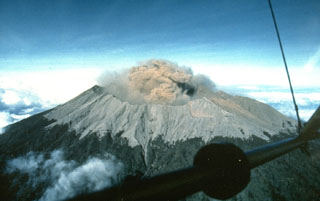Report on Raung (Indonesia) — July 1990
Bulletin of the Global Volcanism Network, vol. 15, no. 7 (July 1990)
Managing Editor: Lindsay McClelland.
Raung (Indonesia) Frequent light ash emissions
Please cite this report as:
Global Volcanism Program, 1990. Report on Raung (Indonesia) (McClelland, L., ed.). Bulletin of the Global Volcanism Network, 15:7. Smithsonian Institution. https://doi.org/10.5479/si.GVP.BGVN199007-263340
Raung
Indonesia
8.119°S, 114.056°E; summit elev. 3260 m
All times are local (unless otherwise noted)
Raung continued to emit brownish-gray ash clouds to 200-300 m above the crater, with light ashfall NW of the volcano. A daily average of 104 ash pulses, one tremor event, and two tectonic earthquakes were detected during July.
Geological Summary. Raung, one of Java's most active volcanoes, is a massive stratovolcano in easternmost Java that was constructed SW of the rim of Ijen caldera. The unvegetated summit is truncated by a dramatic steep-walled, 2-km-wide caldera that has been the site of frequent historical eruptions. A prehistoric collapse of Gunung Gadung on the W flank produced a large debris avalanche that traveled 79 km, reaching nearly to the Indian Ocean. Raung contains several centers constructed along a NE-SW line, with Gunung Suket and Gunung Gadung stratovolcanoes being located to the NE and W, respectively.
Information Contacts: VSI.

